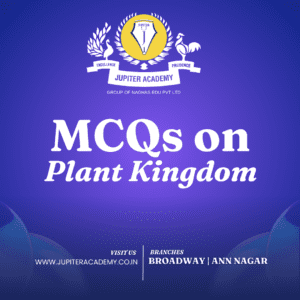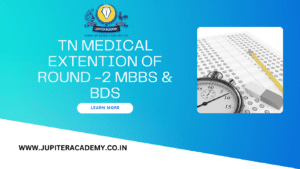NEET 2025: OMR Sheet Filling Tips to Avoid Mistakes Preparing...
Read More
MCQs on Plant Kingdom
The plant kingdom consists of 390,000 species known till date. The plant kingdom is divided into five major groups:
- Thallophyta
- Bryophyta
- Pteridophyta
- Gymnosperms
- Angiosperms
Given below are MCQs on the Plant Kingdom which will help you analyse your understanding on the topic.
Sure! Here are some NEET (National Eligibility cum Entrance Test) style multiple-choice questions on the topic of plant kingdom:
1. Which of the following is a characteristic feature of Bryophytes?
a) Presence of vascular tissue
b) Production of seeds
c) Dominant sporophyte generation
d) Lack of true roots, stems, and leaves
2. Gymnosperms differ from angiosperms in that gymnosperms:
a) Produce flowers
b) Have enclosed seeds
c) Lack vascular tissues
d) Lack seeds
3. Which of the following is not a characteristic of algae?
a) Lack of differentiation into true roots, stems, and leaves
b) Presence of chlorophyll for photosynthesis
c) Presence of a cellulose cell wall
d) Presence of seeds for reproduction
4. In which of the following groups do the members possess both autotrophic and heterotrophic modes of nutrition?
a) Algae
b) Bryophytes
c) Pteridophytes
d) Gymnosperms
5. The characteristic feature of angiosperms is the presence of:
a) Seeds enclosed within fruits
b) Seeds exposed to the environment
c) Rhizoids for absorption
d) Sporangia for reproduction
6. Which of the following is not a pteridophyte?
a) Ferns
b) Club mosses
c) Horsetails
d) Conifers
7. Which of the following is not a reproductive structure in angiosperms?
a) Sepals
b) Stamens
c) Ovules
d) Cones
8. The phenomenon of asexual reproduction in which new plants are formed from the vegetative parts of the parent plant is called:
a) Budding
b) Fragmentation
c) Binary fission
d) Pollination
9. The gametophyte generation in mosses is:
a) Dominant and independent
b) Dominant and dependent
c) Nonexistent
d) Equal to the sporophyte generation
10. Which of the following is a parasitic plant?
a) Fern
b) Orchid
c) Pitcher plant
d) Dodder
Answers:
1. d) Lack of true roots, stems, and leaves
2. b) Have enclosed seeds
3. d) Presence of seeds for reproduction
4. a) Algae
5. a) Seeds enclosed within fruits
6. d) Conifers
7. d) Cones
8. b) Fragmentation
9. a) Dominant and independent
10. d) Dodder
Biology NEET MCQs
11. Which of the following is a non-vascular plant?
(A) Moss (B) Fern (C) Gymnosperm (D) Angiosperm
Answer: (A)
Moss is a non-vascular plant, which means it does not have a vascular system to transport water and nutrients throughout the plant. Ferns, gymnosperms, and angiosperms are all vascular plants.
12. Which of the following is a gymnosperm?
(A) Pine tree (B) Oak tree (C) Rose (D) Sunflower
Answer: (A)
Pine trees are gymnosperms, which are plants that have seeds but no flowers. Oak trees, roses, and sunflowers are all angiosperms, which are plants that have flowers and fruits.
13. Which of the following is a characteristic of angiosperms?
(A) They have flowers and fruits. (B) They have vascular tissue. (C) They are seedless. (D) They are photosynthetic.
Answer: (A)
Angiosperms are characterized by having flowers and fruits. They also have vascular tissue, are seed-bearing, and are photosynthetic.
14. Which of the following is a type of pollination?
(A) Self-pollination (B) Cross-pollination (C) Water pollination (D) Wind pollination
Answer: (B)
Cross-pollination is the transfer of pollen from the anther of one flower to the stigma of another flower. Self-pollination is the transfer of pollen from the anther of one flower to the stigma of the same flower. Water pollination and wind pollination are other types of pollination.
15. Which of the following is a type of fruit?
(A) Drupe (B) Berry (C) Pome (D) All of the above
Answer: (D)
Drupes, berries, and pomes are all types of fruits. Drupes are fruits that have a hard, woody shell surrounding a single seed. Berries are fruits that are soft and fleshy, and they usually have multiple seeds. Pomes are fruits that have a core of flesh and seeds surrounded by a hard rind.
These are just a few examples of NEET MCQs on plant kingdom. There are many other questions that could be asked on this topic. The best way to prepare for NEET is to study the material thoroughly and practice answering questions.
TN Medical 2024 Counseling: Extension of Round 2 for MBBS & BDS
TN Medical 2024 Counseling: Extension of Round 2 for MBBS...
Read MoreTENTATIVE ROUND-II COUNSELLING SCHEDULE FOR ADMISSION TO MBBS/BDS
Registration Starts from 11-09-2024 10:00 A.M to 13-09-2024 05:00 P.M....
Read MoreMCQs on Plant Kingdom MCQs on Plant Kingdom MCQs on Plant Kingdom MCQs on Plant Kingdom MCQs on Plant Kingdom MCQs on Plant Kingdom MCQs on Plant Kingdom MCQs on Plant Kingdom
neet important questions neet important questions neet important questions neet important questions neet important questions neet important questions neet important questions neet important questions neet important questions neet important questions





